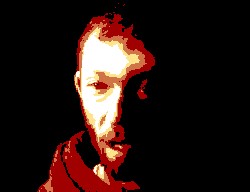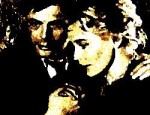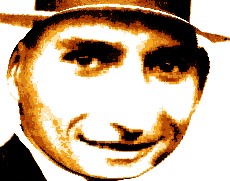Film Review

Le Moine is closely based on the The Monk, a seminal work in English Gothic literature written by Matthew G. Lewis, a 19-year-old diplomat. When it was first published in 1796, Lewis's blasphemous novel created a storm of controversy but it proved to be an instant bestseller, paving the way for subsequent Gothic novels such as Mary Shelley's Frankenstein. The first film adaptation of The Monk, directed by Adonis Kyrou and co-scripted by Luis Buñuel was overshadowed by Russell's film when it was released in 1972. Dominik Moll's version downplays some of the more lurid and sensational aspects of Lewis's novel but still manages to be a potent evocation of 'English Gothic' at its most atmospheric and oppressively haunting.
With his long association with tough, action-oriented roles, Vincent Cassel would seem to be an unlikely choice for the central protagonist, the monk Ambrosio. Whilst Cassel struggles to be entirely convincing as a man wedded to monastic life he nonetheless turns in a compellingly introspective performance, one that conveys (far more subtly than Moll's frenetic mise-en-scène) the inner struggle of a man whose religious devotion is constantly assailed by earthy desires. Ambrosio's corruption by Satan is palpably rendered but Cassel's approximation to a truly great performance is undermined by his director's unfortunate habit of overstatement. A mediocre script doesn't help and pretty well scuppers any hope the supporting cast may have had of distinguishing themselves.
Le Moine impresses most in its first half, which is hard to fault. By combining the familiar Gothic motifs with the distinctive thriller ambiance of his earlier films, Moll succeeds in creating a mood of fearful expectancy, a fanfare heralding the arrival of the Prince of Darkness. The stark contrast between the suffocatingly gloomy monastery interior and sun-drenched Spanish landscape outside provides the most potent visual representation of the forces that govern the world, those of light and darkness, good and evil. This comfortable dichotomy proves to be a false one when we see what the pious followers of Christ get up to within their convents and monasteries. Where the film is most successful is in conveying the idea that evil is all-pervasive and wears many guises. It is evil dressed up in Christian dogma that compels a group of nuns to condemm one of their sisters to the most gruesome of deaths. The Devil is a wily one, you cannot deny it.
Having created his chiaroscuro Gothic nightmare world so brilliantly Moll smashes it to pieces with an ill-judged surfeit of style in the film's second half. In an attempt to shore up a crumbling narrative, Moll ends up drowning in a barely watchable whirlpool of delirium as the main character stumbles and yields his soul to Satan. Watching a talented filmmaker go completely off the rails is never a pretty sight but here Dominik Moll seems to revel in self-indulgence, blissfully unaware of the incoherent mess he is serving up for his audience. Russell's film has its moments of unbridled lunacy but there is a discipline, a guiding intellect behind these that prevents them from puncturing the film's integrity. Le Moine has no such discipline and merely explodes like an over-inflated balloon, obliterating in an instant what might so well have been Moll's masterpiece.
© James Travers 2014
The above content is owned by frenchfilms.org and must not be copied.
Film Synopsis
In 17th century Spain, a newborn baby is found abandoned on the doorstep of a Capucin monastery. Raised by the monks, Brother Ambrosio becomes a preacher of rare passion and intransigence. So devoted is Ambrosio to his faith and teachings that he is thought to be safe from all temptation. But then he comes into contact with a mysterious novice, an encounter that will shake his certainties and lead him down the path towards sin...© James Travers
The above content is owned by frenchfilms.org and must not be copied.
Similar Films
Here are some other films you may enjoy watching:- Amer (2010)
- Diplomatie (2014)
- Une exécution ordinaire (2010)
- Voleurs de chevaux (2007)
- Madame Solario (2012)
Other related links:
Film Credits
- Director: Dominik Moll
- Script: Matthew Lewis (novel), Dominik Moll, Anne-Louise Trividic
- Cinematographer: Patrick Blossier
- Music: Alberto Iglesias
- Cast: Vincent Cassel (Capucin Ambrosio), Déborah François (Valerio), Joséphine Japy (Antonia), Sergi López (Le débauché), Catherine Mouchet (Elvire), Jordi Dauder (Père Miguel), Geraldine Chaplin (L'abbesse), Roxane Duran (Soeur Agnès), Frédéric Noaille (Lorenzo), Javivi (Frère Andrés), Martine Vandeville (Leonella), Pierre-Félix Gravière (Frère Iago), Serge Feuillard (Le tuteur), Ernst Umhauer (Le novice), Jean-Francois Vendroux (L'homme au bébé), Juliette Savary (Une soeur bavarde), Pascal Loison (Le possédé), Gabriel Ignacio (Le procureur), Jean-Charles Dumay (Le juge), Ana Pérez Plasencia (La servante)
- Country: France / Spain
- Language: French
- Support: Color
- Runtime: 101 min
- Aka: The Monk
The very best of Italian cinema

The brighter side of Franz Kafka

The very best fantasy films in French cinema
